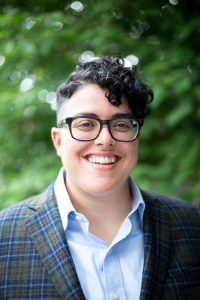Listen to the podcast episode or download the transcript.
Show notes by Rachel Aldred, ATA Director
In this latest episode, ATA Research Fellow Harrie Larrington-Spencer interviews Professor Aimi Hamraie, whose research focuses on disability, accessibility, and urban design. They discuss taking a critical lens on accessibility, active travel, and mobility justice, and the need to broaden our understanding of all three.

Aimi’s work has explored ways in which concepts of accessibility and urban design have institutionalised and limited understandings of disability. For example, most (although still not enough) attention has been paid to mobility impairments, rather than for instance neurodivergence. Moreover, often there is an assumption that individuals have mobility needs which can be resolved through individual adaptations (where this is considered not to be too much work for the system, such as an employer). However, even where adaptations are available – and often they are not – this individualises systemic problems requiring wider solutions.
Aimi and Harrie discuss topics including the concept of independence and ways that technologies such as wheelchairs and adapted bikes are portrayed as allowing people to achieve independent lives. This is a step forward from a paternalistic view of disabled people as necessarily dependent. However, it obscures the extent to which interdependence is a crucial aspect of everyone’s lives, not only disabled people, and ‘independence’ within a globally connected, unequal, capitalist society a chimera.
Another theme raised in the interview relates to anti-fat bias within urban design and planning, including in active travel advocacy and research. Aimi suggests that the growth of ‘healthy cities’ research in the 90s was shaped by wider narratives about the desirability of thinness and of weight loss. (An example of this can be seen in the ‘Fast Lane/Fat Lane’ advertisement, which ran in 2006 in Manchester, UK – link https://www.manchesterfoe.org.uk/loveyourbike/fast-lane-fat-lane-ad-campaign-2006/)
There’s lots of thought-provoking material in this episode for anyone interested in active travel, urban design, or disability. Additional resources are listed below if you want to learn more.
Publications by Aimi
- Hamraie, 2017. Universal Design and the Politics of Disability Building Access — University of Minnesota Press (umn.edu)
- Hamraie, 2018. Enlivened City: Inclusive Design, Biopolitics, and the Philosophy of Liveability Enlivened City: Inclusive Design, Biopolitics, and the Philosophy of Liveability | hc:21407 | Humanities CORE (hcommons.org)
- Hamraie, 2020. Crip Mobility Justice: Ableism and Active Transportation Debates Crip Mobility Justice: Ableism and Active Transportation Debates – Spotlight On The Disabling City (ijurr.org)
On Mobility Justice
- Untokening Collective, 2016. Principles of Mobility Justice Untokening+1.0+web.pdf (squarespace.com)
- Osei, 2023. Active Travel Academy » Barriers to Black men cycling in London: ATA Podcast 2023:3 (westminster.ac.uk), also Osei and Aldred, “You always think about what other people be thinking”: Black men and barriers to cycling in London, Journal of Transport Geography, April 2023
On reclaiming Crip and Queer
- McRuer, R. 2006. Crip Theory. Crip Theory (nyupress.org)
- Kafer, A. 2013. Feminist Queer Crip. Feminist, Queer, Crip (iupress.org)
On anti-fat bias and fat studies
- Colls, R. and Evans, B. 2013. Making space for fat bodies? A critical account of ‘the obesogenic environment’, Progress in Human Geography.
- Weight bias on Wheels? An interview with Francis Ray White and Rachel Aldred, elaborated by Alessia Giorgiutti, 2023
- School Streets: ATA podcast 2024:2 - July 1, 2024
- Accessibility and Urban Design: ATA podcast 2024:1 - January 25, 2024
- Queering Cartographic Methods: ATA podcast 2023:4 - July 6, 2023